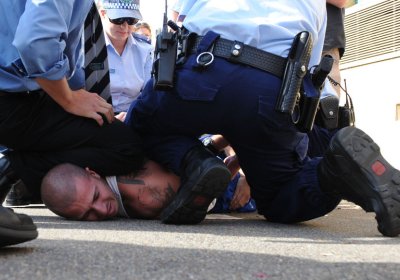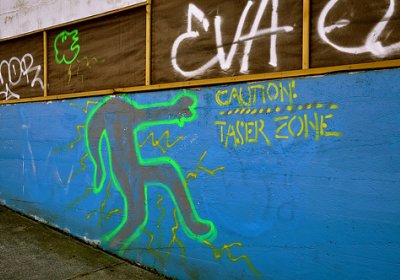Heavy-handed policing in Sydney over the past few months may indicate a heightened, anti-protester attitude of NSW police.
States and territories across Australia have either a “permit” or “notice” procedure for holding protests.
NSW law has the “notice” procedure, which is very favourable for those organising protests. The completion of a simple form, given to the police with seven days’ notice, protects activists from arrest for offences like obstructing traffic.
This favourable legal situation no doubt frustrates police, who are using more aggressive means to curb protests.
Dale Mills
A fresh federal government inquiry was announced on January 14 into the alleged torture of former Guantanamo Bay detainee Mamdouh Habib.
This follows the release of independent evidence supporting Habib’s claims and the recent undisclosed compensation settlement the Australian government made with him in December.
Prime Minister Julia Gillard had asked the inspector-general of intelligence and security Vivienne Thom to conduct the inquiry after new evidence was presented supporting Habib’s allegations that Australian officials were involved in his torture in Egypt in 2001.
A common right-wing perception is that one either is, or is not, a member of David Hicks’ “cheer squad”.
Chris Merritt, reviewing this book in the October 22 Australian, actually referred to a Hick’s “cheer squad”. Merritt lamented: “The whole appalling story of his treatment by the US military commission would be trotted out.”
Trotted out? A clever way to admit that what Hick’s says is true, but at the same time trivialise the details.
I am not sure what Hicks’ personal views have been on a number of issues, and not addressing them is perhaps a weakness of the book.
Police violence has come under the spotlight once again, as it tends to do every six months or so. Sometimes it is when two or more incidents occur together, or it is when the media have decided that the last story about misbehaving police has been forgotten, and now is the time for a new one.
A spectre is haunting the healthcare system — the spectre of Big Pharma.
Fears over the side effects of a widely used diabetes medication in Australia have revealed the power of big money and its influence on the healthcare system.
The medication — known as Avandia — is under fire for potentially causing heart attacks and strokes in patients. The manufacturer, GlaxoSmithKline (GSK), is accused of hiding evidence of the drug’s harmful side-effects.
“A juggernaut out of control” is how lawyer Rob Stary described the Australian Federal Police and ASIO after a judge concluded a case against three Tamils in April 2010.
A spokesperson for the AFP defended its prosecution, saying that the criminal inquiry had been “complex” and “challenging.”
In Queensland, the police commissioner has been reported as saying that he opposed the publication of the Crime and Misconduct Commission report into the death of Mulrunji Doomadgee, who had his liver split in two after Sergeant Chris Hurly fell on him in a “complicated” way.
US intelligence services are closely monitoring the movements of Wikileaks’ founder, Julian Assange, after he said the website would soon release a classified Pentagon video showing a May 2009 US air strike in Afghanistan that killed up to 140 civilians.
The “Garani” video, if released, would follow the video released by Wikileaks in May, which showed US soldiers in an Apache helicopter fatally shooting about a dozen civilians in Iraq, including a reporter from news agency Reuters.
That video received worldwide prominence and considerably heightened Wikileaks’ profile.
Authoritarian governments hate sex, and it seems the Australian government is no exception.
The current target is the adult porn industry, with a focused attempt to roll back access to adult and consensual pornography. Money and resources are thus diverted from real evils, such as the physical and sexual abuse of children.
On May 21, the Fairfax press announced that incoming passenger cards for those arriving in Australia had been changed so individuals would now be obliged to declare whether or not they had pornography in their possession.
A customs officer at Melbourne airport has said the passport of the Australian founder of Wikileaks will be cancelled “soon”.
Julian Assange, formerly from Melbourne, now stays in several countries while running the high-profile Wikileaks website. He usually avoids publicity, but became famous in April when his site released a classified video of US forces laughing after killing 12 people in Iraq, including two staff from the news agency Reuters.
Iranian cleric Dr Mansour Leghaei is being removed from Australia after being resident here for 16 years. Immigration minister Chris Evans has refused to allow Leghaei to stay, following an adverse security assessment by the Australian Security Intelligence Organisation (ASIO).
Leghaei has committed no crime, incited no hatred and is the father of one of Australia's “working families” — that demographic otherwise loved by the Australian government. As he is not an Australian citizen, he is unable to challenge ASIO's security assessment.
A secret review of Australia’s intelligence services has proposed giving them new powers to spy on Australians, carry weapons and conduct secretive paramilitary operations in other countries.
Powers to carry weapons are proposed for employees of the Australian Security Intelligence Organisation (ASIO), which has already received a vast expansion of legal powers since 2001, extra personnel and a new purpose-built Canberra headquarters.
Senior Queensland police officers have been accused of using improper methods to cover up for fellow police officers when investigating the death of 36-year-old Palm Island man Mulrunji Doomadgee in 2004.
A coroner has described Doomadgee’s November 2004 arrest for intoxication as “not an appropriate exercise of police discretion”. Within an hour of the arrest by Senior Sergeant Chris Hurley, Doomadgee had died from blows to his body which almost split his liver in two.
- Page 1
- Next page








